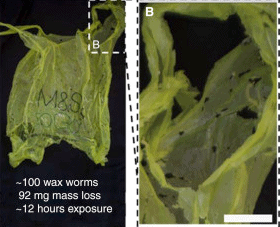To get rid of your plastic bags
And help reduce your waste
Buy yourself some nice wax worms,
They have exquisite taste.
A handful of these waxy beasts
Can maim a plastic sheet;
What to the Earth is poison
Is to these larvae meat.
Now normally they are a pest
Eating the wax of bees
But give them polyethylene –
They poop out antifreeze.
Yet breeding worms is not ideal,
It can cause lots of strife;
So in the short-term here’s a tip:
Just buy a bag for life.

This is a didactic poem, inspired by recent research which has discovered a type of worm that digests plastic bags and excretes antifreeze in the process.
Every year we use over 1 trillion plastic bags, which are largely made up of synthetic polymers (such as polyethylene and polypropylene) that are resistant to biodegradation. As a result, approximately a third of these bags end up in landfill sites, representing a significant environmental impact. This research investigates the effectiveness of the wax worm in breaking down polyethylene through digestion.
The wax worm is the caterpillar larva of the wax moth (Galleria mellonella), a species that normally feeds on beeswax, and which can cause significant damage to beehives. Researchers found that these wax worms could breakdown the plastic bags at a relatively fast rate, with an estimated 2.2±1.2 holes made in a polyethylene sheet per worm per hour. Over approximately 12 hours of contact, 100 of these wax worms ate their way through 0.092 g of polyethylene, which is significantly faster than any previous biodegradation techniques for this polymer. As part of the digestion process, the wax worms also excrete ethylene glycol, the main compound in antifreeze. Whilst these worms do not present a complete solution to the removal of plastic bags from landfill sites (the worms cannot survive in such oxygen-starved environments), it is hoped that the enzyme that the worms use to break down the plastic can be isolated and extracted for future applications.
An audio version of the poem can be heard here.
excellent Sam, like always a pleasure,
have a good wekend,
Rolf
Thanks Rolf 🙂
You too,
Sam